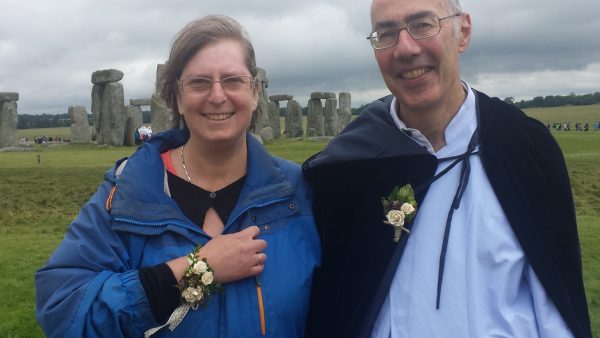
by Michael | Nov 16, 2020 | Blog
It’s mid-November. Christmas adverts on TV are already the norm. It will soon be time for wall-to-wall carols on the radio. The New Year will be upon us sooner than we realise.
A year ago, nobody could have foreseen the direction the new year would take. Without exception, everybody has been affected, to a lesser or greater extent. Job losses, health issues – even, deaths – isolation … the list goes on.
So, what will the future hold? Can we look forward to the next month or two? Dare we be positive about 2021?
Of course, I have no crystal ball. The threatened ‘spike’ may materialise. The virus may, however, have done its worst. Whether improved testing and the emergence of a vaccine will actually make a difference remains to be seen. We simply cannot tell.
All we can do is to let life go on, as best we can.
That means making plans again.
If you have forthcoming happy events, do consider marking them. It’s important to us as humans to celebrate. It might be a wedding, or an anniversary (especially, one ending in a -5 or -0). It might be a naming or a handfasting. It could certainly be a vow renewal. Just possibly, a promotion at work. But don’t ignore it.
Of course, whether you hold a micro-event or something larger depends on the date of your ceremony and what the current regulations will be.
So it may be a gamble. Thus it may be easiest to arrange something that can be adapted at fairly short notice. That probably entails liaising with your venue (if you’re booking one at all) and/or suppliers, and checking how flexible they are.
I believe that things will ease up in 2021 (may my words not come back to haunt me!). As social animals, we do need to break the isolation at some point. Hopefully, this can be done in a controlled way, and a ceremony may be exactly what the doctor (!) ordered.
If you are thinking of organising something a bit special, then please have a chat with me.
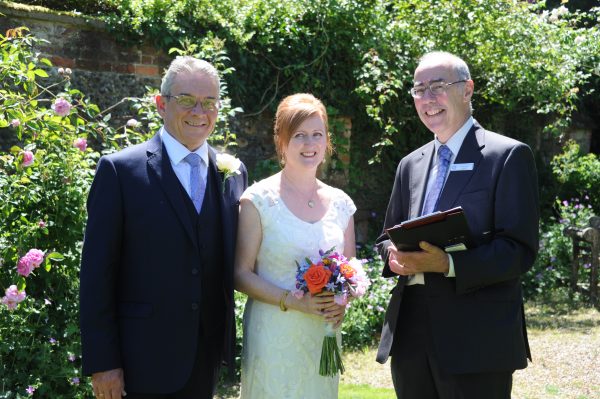
by Michael | Nov 11, 2019 | Blog
People sometimes think the civil celebrant cost for a ceremony is not justified. Uncle John can do that just as well – and for free!
But will Uncle John be able to put together – let alone present – a ceremony that is memorable (for the right reasons)? Does he have the writing and presentation skills, for example?
A lot of people think that all a civil celebrant has to do is to rock up at the ‘gig’ and deliver a few well-chosen words and then go home. Money for old rope, as they say.
However, it’s actually a lot more than that for me.
The ideal
My mission
is to cultivate a relationship between myself and the client. I want them to
trust me and feel there’s rapport. That’s especially important if I’m going to
be conducting their ceremony on the most important day of their lives!
I make it my goal when we meet to ask the right questions and actually listen to the responses. Then I can understand the clients’ vision and be in a position to help them realise it.
I compile a ceremony that reflects their personalities and beliefs and which is everything they want.
I take pride
in conducting an impeccable ceremony.
Finally, I appreciate that I am privileged to be part of the couple’s excitement and joy.
How do I achieve that?
Firstly,
cultivating a close relationship takes time, as well as patience and tact. (I
do not end up working with every person who enquires about my services.)
I don’t
assume I know the clients’ wishes better than they do. I will advise them, if I
feel, from my considerable experience, that something might, or might not,
work; however, it is their big day, and I never forget that.
I am happy
to give advice, if the clients are unsure what to do. The goal is to draw up a unique,
personalised ceremony that fulfils the clients’ dreams.
Either way,
we normally exchange drafts until the clients are happy with every word.
I always bear in mind that it’s not about me, but the clients. I present clearly and beautifully. I won’t accept second best.
The bottom line
I trained
both as a funeral celebrant and as a celebratory celebrant, and that training
was not cheap.
I have considerable experience – I graduated as a celebrant in late 2012 and have now conducted over 150 ceremonies (including weddings (same-sex and heterosexual), vow renewals, handfastings, namings and funerals). It’s difficult to put a price on such experience.
My many
testimonials demonstrate that I am professional but friendly, and focussed on achieving
my clients’ goals.
On the day,
I will normally arrive an hour early. I check everything is in place at the
venue and reassure the groom! I am a calming influence at a frenetic time.
When I
conduct the ceremony, I use my considerable presentation skills. I foster a
warm atmosphere and make the guests feel included too. Such skills come at a
price.
All this is why I charge a fee. if you try me, I hope you’ll agree that I do earn it!
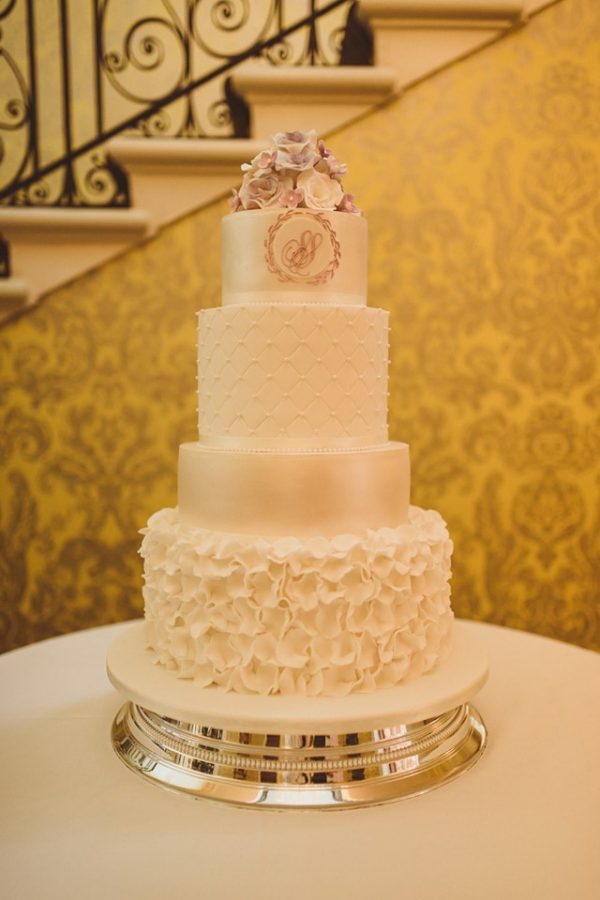
by Michael | Oct 21, 2019 | Blog
Yum! You’ll
be licking your lips at the prospect of this blog, after reading the title!
Well, I’ll
try and keep it light, but it’s an important area.
As far as legal registration is concerned, we’re only talking about births, deaths and weddings. You don’t need any paperwork to celebrate a Vow Renewal or handfasting.
With births,
the registration is almost always done at the hospital (although I realise that
not everybody has their baby there). For deaths, the doctor (either at home or,
again, at the hospital) usually provides the death certificate, and you take it
to the local Register Office.
With
weddings it’s a little more complex.
Religious weddings
If the wedding is conducted in an Anglican church or synagogue, or according to the Quaker service, then there is normally a member of the church (etc.) present who is a registrar. They will ensure the legalities are carried out.
If you’re
having a marriage anywhere else, then things are different. That’s where it
gets more complicated!
Register Office
You need to register your intention to marry at least 28 days in advance. Then you go to the Register Office (by appointment) with two witnesses, and can get legally married. The ceremony will be totally secular and fairly standardised (so next-to-nothing to differentiate one service from the next).
You don’t necessarily have to go to the Register Office. Legislation is going to change, but for now, provided the wedding venue has four solid walls and a roof (basically), the registrars can come out to the venue and conduct the wedding for you there. (This will cost several hundred pounds more than attending the Register Office.)
Another alternative
You can have a civil celebrant-led ceremony. This may allow you a religious (or partially-religious) or a secular ceremony – but the choice is ultimately yours. The big thing – setting this option out from the other two – is that you can have the ceremony of your dreams. Why? Because the celebrant should work with you in advance to respect and enable your vision. It’s all about personalising, rather than following a standard rubric. That means your ceremony will be unique, and can reflect your personalities and beliefs.
The downside
is that (again, there is new legislation in the air for England & Wales)
currently a civil celebrant’s ceremony has no legal validity. So you still have
to have the Registrar-led ceremony (either in their office or at your chosen
venue, if it’s suitable) in addition.
Either way,
once you’re legally married, you can have the dream ceremony, conducted by the
celebrant, afterwards. To all intents and purposes, that will be your real
wedding!
Hopefully, not so painful, was it? But if you have any questions, please feel free to ask me.
Photo: Matt Penberthy
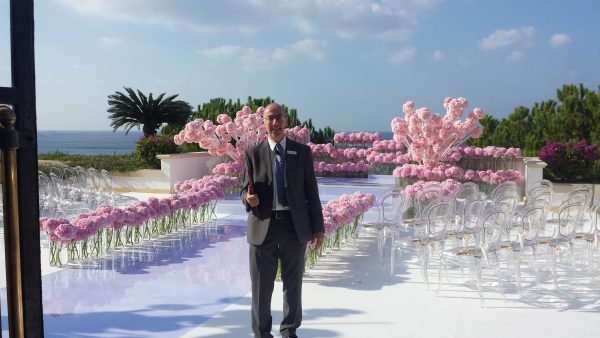
by Michael | Oct 14, 2019 | Blog
I was recently interviewed by a newspaper reporter. Fame at last, I hear you say! However, she was a trainee, and was merely getting in some practice!
However, she asked three questions in particular which seemed worth repeating, so I’ll answer them again in today’s blog.
What is a civil celebrant?
A civil celebrant works with the client to create a totally personalised ceremony, which they then conduct. This could be a wedding, vow renewal, handfasting, naming ceremony, or whatever is required.
Depending on
the type of celebrant, the ceremony can be religious, part-religious or
non-religious.
The celebrant is not normally obliged to produce a standard ceremony. It can be personalised and, thus, unique.
Note that a celebrant-led wedding does not have legal validity in England & Wales (at present), so registrars are still required.
Why are civil ceremonies becoming
increasingly popular?
Probably
because not everyone wants a full religious service. At the other extreme, a
Register Office ceremony is fairly standardised and, of course, completely
secular.
For those who want a hint of religion only, what the civil celebrant offers is ideal.
There are
some (Catholic divorcees, for example) who might welcome a full religious
service and are denied it by the Church, so they can go to a (non-humanist)
civil celebrant.
Others are happy with a secular ceremony, but want something unique (which the Register Office doesn’t offer).
Tell us about some of your unique
experiences and ceremonies
I’ve conducted over 150 ceremonies, and most stick in the mind (usually for good!).
I think two ceremonies are particularly memorable, though.
Firstly, I conducted a September wedding in Cyprus. This involved me reading a couple of paragraphs in Russian (I have a Modern Languages degree, so this wasn’t the hardship it may appear!). The venue was a 5-star hotel, full of flowers, overlooking the sea. A ravishing setting.
However, I also remember the bride. It is understandable that she wanted perfection on her big day, but she came across – at least! – as OCD. Before she employed me, she interviewed me (and sent her parents a recording of me reading Russian). She consistently made unreasonable demands on her groom, humiliating him even in front of suppliers. (If I had been him, I wouldn’t have married her!)
However, she
came up smelling of roses on the day, and it was a fabulous event.
My other favourite was a contrasting occasion. This was also in the open air, much lower-budget, during a very wet January near Salisbury (Old Sarum). The groom was half-Jewish and the bride pagan, and elements of both religions were combined in the service.
Apart from
the setting and the intrinsic interest of the mixed-faith rituals, the weather
was notable. The night before, I had driven through torrential rain for a
couple of hours to reach my hotel. When I drove back after the ceremony, I had
to pass through a severe thunderstorm.
On the morning itself, I arrived early to set up. Unfortunately, the couple were marrying at the Register Office in Salisbury and got caught in a terrible traffic jam, delaying them the best part of an hour. I therefore had to stay on the hilltop for a couple of hours unprotected, at the mercy of the elements. Amazingly, it was quite mild and even stayed dry!
After my moment in the spotlight, I guess it’s just a matter of time before that call comes in from “The Times”!
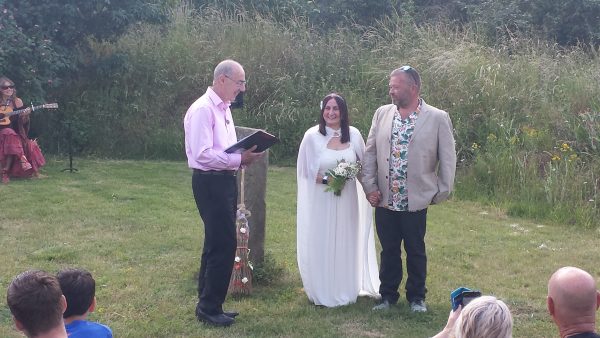
by Michael | Apr 29, 2019 | Blog
Unless you’re a Pagan, it may have escaped you
that today is Beltane. It’s a fire ritual and has some interesting traditions.
What is it?
Beltane is a fire festival, and originates
from the Celtic God ‘Bel’, meaning ‘the bright one’ and the Gaelic word ‘teine’,
meaning fire.
Beltane honours life. Taking place on 30th
April, it represents the peak of Spring and the beginning of Summer. The theme
is fertility.
On the eve of the month of May, the sexuality
of life and the earth is at its peak.
The Maiden goddess has reached her fullness.
She is the manifestation of growth and renewal. She can be known as Flora, the
Goddess of Spring, the May Queen or the May Bride.
The Young Oak King or Jack-in-the-Green or the
Green Man falls in love with her and she accepts him.
The May Queen falls pregnant.
The couple are symbols of the Sacred Marriage,
the union of Earth and Sky. This is the night of the Greenwood Marriage.
Beltane traditions
As this is a fire festival, bonfires are lit to honour the sun and
encourage the support of Bel and the Sun’s light to prosper the coming harvest
and protect the community.
Traditionally, all fires in the community would have to be extinguished. Then a special fire, known as ‘tein-eigen’, or ‘need-fire’ is kindled for Beltane.
,People would jump the fire for cleansing, purification, and fertility. Some couples would jump together (to pledge continuing fidelity) and cattle and other animals would be driven through the smoke as a protection against disease and to bring fertility.
Finally, the villagers would take some of the Tein-eigen to start their own fires again.
Ceremonies
As Beltane celebrates the Great Wedding of the Goddess and the God, it
is a popular time for pagan weddings or handfastings.
If you would like to find out more about how you can mark Beltane, it’s possibly a little late now! However, if you’d like to consider a handfasting, then please get in touch!
For some ideas, please have a look at my YouTube channel (and subscribe!): https://www.youtube.com/channel/UC1wWfxIZw0VpZLbHrJAbV6A?view_as=subscriber





